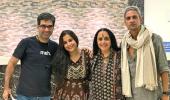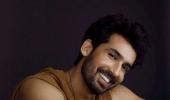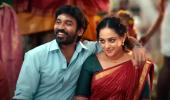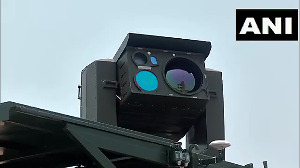'I was one of those children who didn't feel I had to adhere to instructions on how to behave.'
'That must have made things very awkward for my parents.'

Rasika Dugal is an actor who can balance both indie cinema or mainstream movies with ease.
Beena Tripathi in the Mirzapur series is a far cry from Constable Neeti Singh in Delhi Crime.
Rasika's talent shines through in films like Qissa, Hamid and Manto that feature her in characters full of quiet complexity and strength.
In contrast, her performance in the zany comedy Lootcase sees her embody sassy housewife Lata, a character as quirky and bright as the film itself.
It is for these spunky choices that Rasika was felicitated with the Diversity Champion award, honouring her diverse body of work, at the Indian Film Festival of Melbourne.
The festival saw the world premiere of Rasika's new film Little Thomas, a family drama co-starring Gulshan Devaiah.
"If somebody labels me as an OTT actor or an indie cinema actor, they're both labels that I wear very proudly because these spaces have given me a lot," Rasika tells Mayur Sanap/Rediff.com in the first part of a lively interview.
What is Little Thomas about?
It is a beautiful story about the life of a family in Goa and how they navigate their financial difficulties, the ups and downs of their relationship, the relationship between a couple who have been married for so long.
It is about how they navigate dealing with a growing child who is asking all sorts of awkward questions and a child who desperately wants a sibling.
They run an old bakery, which they are trying to preserve.
It is set in the '90s and our director Kaushal Oza has a very quiet and interesting way of telling the story, which I'm always very drawn to.

Since the film is set in the '90s, what are your fond memories from that time period?
The '90s is when I grew up.
I remember so much from the popular culture, the ads, jingles, TV serials, films.
The pre-cell phone era had a charm of its own.
I romanticised that time because the pace of life today is a bit too much for me. That time suited my personality better.
It didn't feel like it was an era that I had to work towards understanding. I'm still trying to cope with the pace of life for today.

You are playing a mother of a young child in Little Thomas. Did this film give you a look back at your childhood?
In a way, yes, in terms of how adults react to children, their curiosity and their questions.
Jessie and her husband react exactly like adults in India often do. They don't address the question, they're too awkward to answer questions, so they kind of skirt around it, and make up stories so that the child is entertained and engaged.
I think that's how we grew up, where parents didn't really address your questions, they just skirted around it because they were too awkward to answer them.
New age parents have conversations with their children and don't paper over things. They address the questions.
There's a kind of maturity in conversations between the adult and the child, which wasn't there at that time.
How were you as a child?
I think you have to ask this question to my parents. (Laughs)
From what I've heard around me, I was quite fearless.
Adults often give instructions to children, 'Oh! don't say this in front of this person' or 'Don't say that to somebody or they might get angry' and all of that.
But I was one of those children who didn't really feel that I had to adhere to instructions on how to behave.
I was irreverent and muhphat (blunt). I think that must have made things very awkward for my parents.

What kind of reactions are coming your way after the premiere?
The audiences at film festivals are so intelligent and discerning. Their questions are so interesting, it really makes you feel rewarded as a performer because they will notice all the things that you have done.
For example, I learned how to play the piano for this film and that's a very tiny part of the film. It's not the main story.
But while working on the film, it became my connect with this character Jessie Miranda. She has a passion for music but never gets to realise that passion because of life taking over.
There are so many people around us who do not get an opportunity in life to explore their passion and their talent. She's that person.
I learned how to play the piano for three months because it's not an easy thing.
I was saying that the audience is so good because I was wondering if anybody would have noticed that.
Sure enough, there was a question from the audience right after saying that, 'Did you learn how to play the piano?'
It's because they saw shots in which the camera goes directly from my hands to my face. So there's no opportunity to have somebody else do that.
So you have to play the piano yourself, and these were some of the toughest pieces that exist like the one piece was Mozart's Sonata Number 16, one was by Schumann, one was Chopin.
These people are master composers, so to play their work was not easy. And definitely not easy in just three months.
The audience knew that, so it was nice that somebody saw that in my work and asked me that question.
Film festival audiences are always like that. They are lovely.
Also, there's just so much love for our work from the Indian diaspora in Melbourne. People were just so warm and so excited to meet us.
I met a couple of people on the road while I was taking a walk in the city and I invited them for the screening and they came. I was very happy.












 © 2025
© 2025